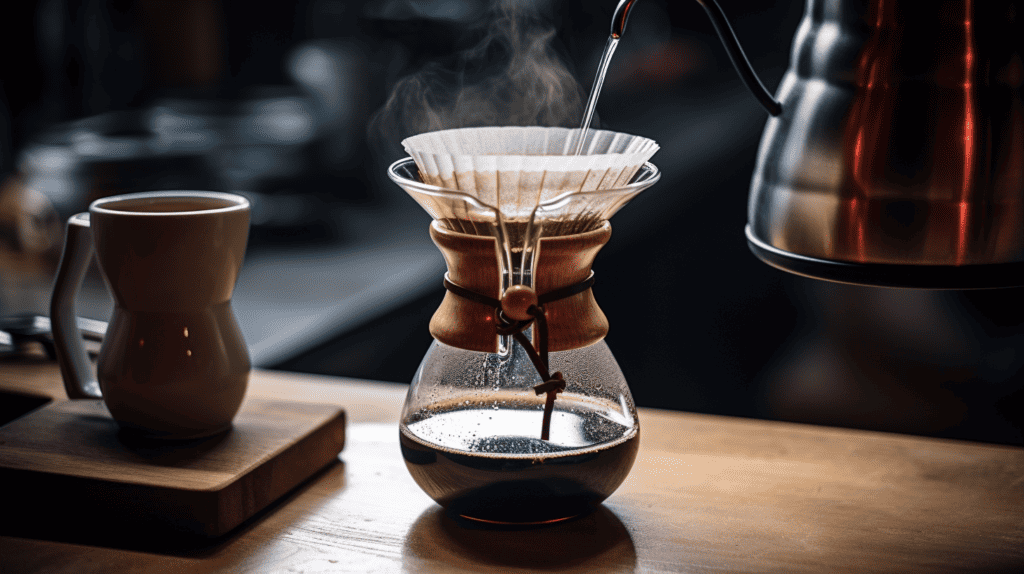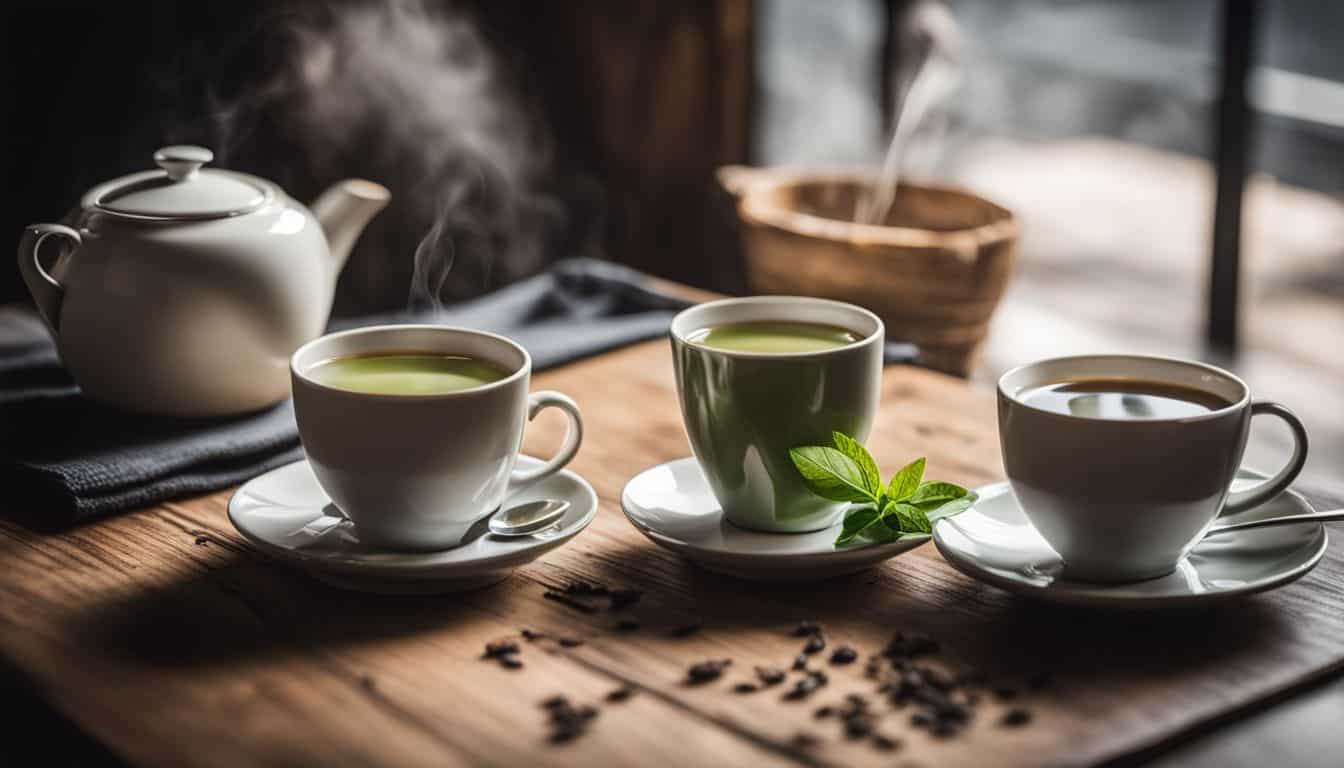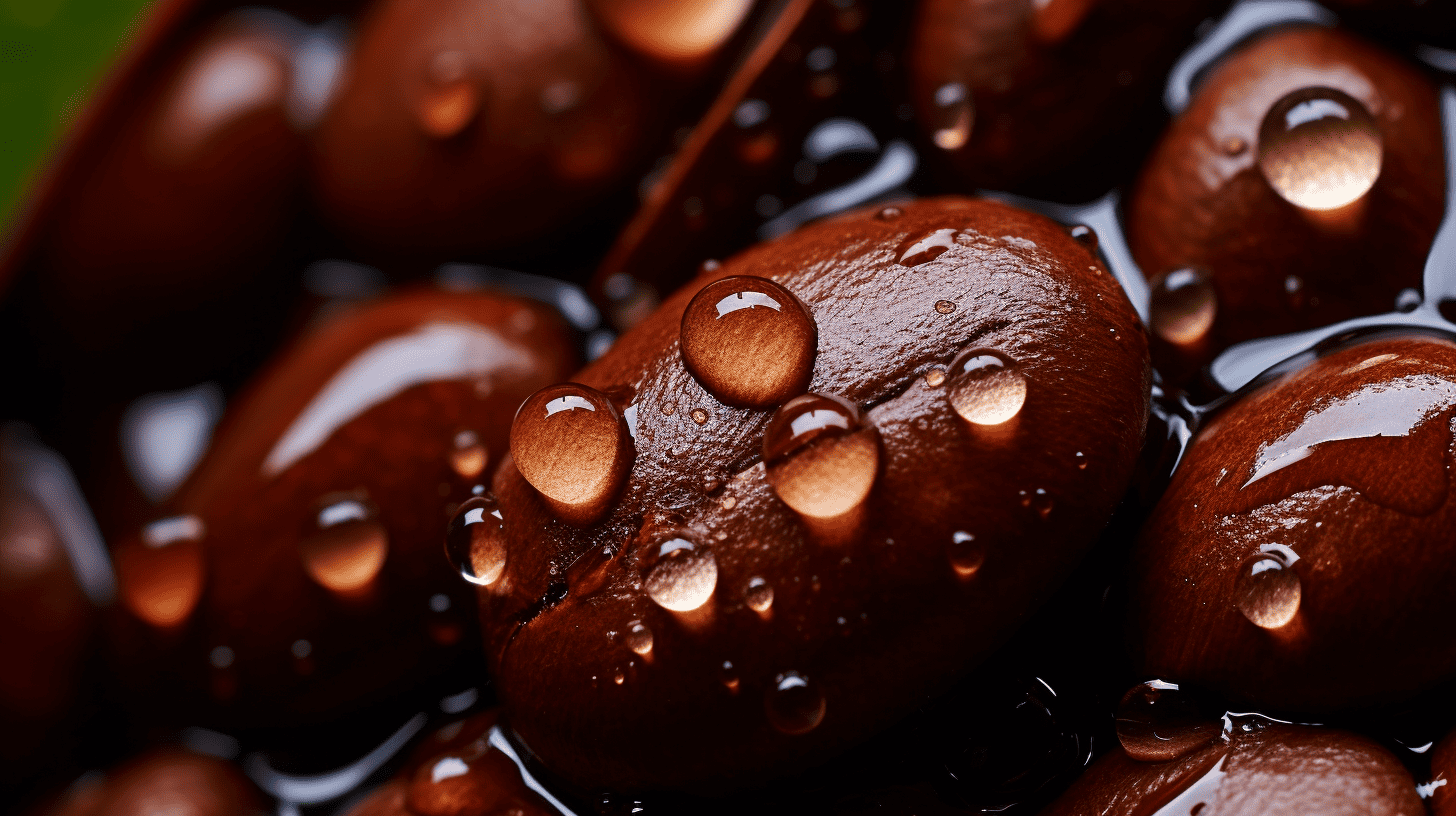Are you constantly pondering over what’s a better energy booster – coffee or those colorful cans of energy drinks? Believe me, I’ve been there too. Backed by reliable research and facts like “Coffee contains 18mg of caffeine per ounce while energy drinks only contain 10mg”, this blog post will analyze the two popular stimulants, comparing their effects on health, cost, and more.
Let’s unravel the truth together!
Key Takeaways
- Coffee contains more caffeine per ounce than energy drinks, making it a better choice for sustained energy.
- Coffee generally has little to no sugar and fewer calories compared to energy drinks, making it a healthier option.
- Regular coffee consumption has several health benefits, including increased alertness, improved cognitive function, and lower risk of certain diseases.
- Both coffee and energy drinks have potential risks such as sleep disturbances, addiction, and increased heart rate. Moderation is key when consuming these beverages.
- Coffee is generally more affordable than energy drinks and offers various options at different price points. Choosing coffee can help save money while still getting the desired caffeine boost.
Comparison of Coffee and Energy Drinks
Here is a comparison table of Coffee vs Energy Drinks:
| Aspect | Coffee | Energy Drinks |
|---|---|---|
| Caffeine Content | Varies depending on the type and brewing method, but generally around 95 mg per cup | Varies depending on the brand and serving size, but can range from 80-200 mg per serving |
| Calories | Almost zero calories | Can contain high amounts of calories |
| Sugar Content | Depends on personal preference and added sweeteners | Can contain high amounts of sugar |
| Vitamins | Contains less vitamins compared to some energy drinks | Some energy drinks contain vitamins, including B vitamins |
| Taste | Contains fewer vitamins compared to some energy drinks | Offers a wide variety of flavors |
| Health Considerations | Can be a healthier choice when consumed without added sugar | Can contain high amounts of sugar and calories |
It’s important to note that the caffeine content in coffee can vary depending on factors such as the type of coffee bean, brewing method, and serving size. Additionally, individual tolerance to caffeine may vary.
Ultimately, the choice between coffee and energy drinks depends on personal preference, caffeine tolerance, and health considerations. Coffee is a natural source of caffeine and offers a wide variety of flavors and brewing methods. On the other hand, energy drinks provide a convenient and quick energy boost but can contain high amounts of sugar and calories.
Coffee and energy drinks differ in their caffeine content, sugar content, and calorie content.
Caffeine content
As a fellow coffee enthusiast, I bet you’re interested in knowing the caffeine content of our favorite brew versus that of energy drinks. Let me lay down the facts for you.
So, it’s clear. Our beloved coffee has more caffeine per ounce than energy drinks. Even a Starbucks grande Caffe Americano packs in a whopping 225mg of caffeine, outdoing any standard energy drink. And remember, it’s coffee that offers us sustained energy, while energy drinks might lag in this department. It’s a win for coffee!
Sugar content
Sugar content is an important factor to consider when comparing coffee and energy drinks. Coffee generally has no calories, meaning it contains little to no sugar. On the other hand, energy drinks often have a high amount of sugar, which can lead to negative health effects if consumed in excess. Choosing coffee over energy drinks can be a healthier choice due to its lower levels of sugar and being made from ground coffee beans. So, if you’re looking for a beverage with less sugar, coffee is definitely the way to go.
Calorie content
When it comes to calorie content, coffee has the advantage over energy drinks. Coffee itself contains no calories, making it a great choice for those watching their calorie intake. On the other hand, energy drinks often have high sugar, which means they can be quite calorific. This is something to keep in mind if you’re trying to maintain a healthy diet while still getting that caffeine boost. So if you’re looking for a lower-calorie option, coffee is the way to go. It’s a simple and straightforward choice when it comes to keeping your calorie consumption in check.
Health Effects of Coffee
Coffee has been found to have several health benefits, including increased alertness and improved cognitive performance.
Benefits
Coffee offers several benefits that make it a popular choice for many coffee enthusiasts:
- Increased Alertness: Coffee is known for its ability to increase alertness and improve focus, thanks to its caffeine content.
- Enhanced Performance: The caffeine in coffee can boost physical and mental performance, making it a great choice for athletes or those needing a productivity boost.
- Mood Improvement: Coffee has been linked to improved mood and reduced risk of depression due to its stimulating effects on the central nervous system.
- Antioxidant Rich: Coffee is a rich source of antioxidants, which help protect the body from damage caused by harmful free radicals.
- Lower Risk of Certain Diseases: Studies have shown that regular coffee consumption may lower the risk of conditions such as type 2 diabetes, Parkinson’s disease, and liver disease.
- Increased Metabolism: The caffeine in coffee can temporarily increase metabolism, leading to increased calorie burning and potential weight loss.
- Boosted Physical Endurance: Drinking coffee before exercise has been found to enhance physical endurance and delay fatigue.
- Nutrient Source: Coffee contains essential nutrients like magnesium, potassium, and riboflavin (vitamin B2), which contribute to overall health and well-being.
- Improved Cognitive Function: Regular coffee consumption has been linked to improved cognitive function, including memory retention and problem-solving abilities.
- Social Connection: Enjoying a cup of coffee with friends or family provides an opportunity for social interaction and connection, which can contribute to overall well-being.
Potential risks
When it comes to potential risks, both coffee and energy drinks have some concerns that should be considered. Here are the potential risks associated with consuming these beverages:
- Sleep deprivation: Consuming coffee or energy drinks late in the day can disrupt your sleep patterns and lead to sleep deprivation.
- Productivity decline: Relying on caffeine from coffee or energy drinks to stay alert can mask fatigue and lead to a decline in productivity over time.
- Addiction: Both coffee and energy drinks contain caffeine, which can lead to dependence and addiction if consumed in large amounts regularly.
- Withdrawal symptoms: If you consume high amounts of caffeine from either coffee or energy drinks and then suddenly stop, you may experience withdrawal symptoms such as headaches, irritability, and fatigue.
- Potential heart issues: While coffee alone does not significantly impact heart rhythm or blood pressure, energy drinks containing high levels of caffeine and other stimulants may increase the risk of irregular heart rhythms and elevated blood pressure.
Health Effects of Energy Drinks
Energy drinks can provide a temporary boost of energy and alertness due to their high caffeine content, but excessive consumption can lead to potential risks such as increased heart rhythm and blood pressure.
Benefits
Coffee has several benefits, making it a popular choice among coffee enthusiasts like me. Here are some of the benefits:
- Coffee can improve alertness and enhance performance due to its caffeine content.
- It can boost energy levels and combat fatigue, making it an ideal choice for those long days or early mornings.
- Coffee is believed to have antioxidant properties, which can help protect cells from damage.
- Studies have shown that regular coffee consumption may reduce the risk of certain diseases, such as Parkinson’s disease, type 2 diabetes, and liver disease.
- Drinking coffee in moderation is also associated with a lower risk of stroke and certain types of cancer.
- Consuming black coffee without any added sweeteners or creamers can be a low – calorie option for those watching their weight.
Potential risks
Here are some potential risks of consuming coffee and energy drinks:
- Increased heart rate and blood pressure: Both coffee and energy drinks can cause a temporary increase in heart rate and blood pressure due to their caffeine content.
- Sleep disturbances: Consuming coffee or energy drinks close to bedtime can disrupt sleep patterns, leading to difficulty falling asleep or staying asleep.
- Dehydration: Energy drinks, especially those high in caffeine, can have diuretic effects, causing increased urine production and potentially leading to dehydration if not enough fluids are consumed.
- Addiction and withdrawal symptoms: Regular consumption of caffeine from coffee or energy drinks can lead to dependence and cravings, resulting in withdrawal symptoms like headaches, irritability, and fatigue when the intake is suddenly stopped.
- Interference with nutrient absorption: Coffee contains compounds that can interfere with the absorption of certain minerals like iron and calcium, which are important for overall health.
- Increased risk of acid reflux: The acidity in coffee can contribute to the development or worsening of acid reflux symptoms in some individuals.
- Dental problems: Energy drinks often contain high levels of sugar and acids that can erode tooth enamel over time, leading to dental cavities and sensitivity.

Cost Comparison
Let’s talk about the cost comparison between coffee and energy drinks. When it comes to price, coffee tends to be more affordable than energy drinks. By making your own coffee at home or buying a cup from a café, you can save money compared to regularly purchasing energy drinks. Remember, energy drinks are often sold in individual cans or bottles that can add up in cost over time. By choosing coffee as your go-to beverage, you can enjoy the boost of caffeine without breaking the bank.
Coffee is also versatile when it comes to cost since there are many different options available at various price points. You can choose from different brands and flavors based on your preferences and budget. Additionally, if you opt for regular brewed coffee instead of fancy specialty beverages, you’ll typically pay less.
In contrast, energy drinks often come with a higher price tag due to their marketing and branding efforts. While they may provide a quick pick-me-up, they tend to be more expensive per serving compared to coffee. So if you’re looking for an economical option that still provides caffeine and keeps you alert throughout the day, consider choosing coffee over energy drinks.
Overall, when considering both taste and affordability factors together with other important comparisons we’ve discussed earlier such as health effects and ingredients – such as sugar levels- , I believe that opting for plain black brewed coffee is not only a healthier choice but also cost-effective solution for maintaining your daily caffeine fix without compromising on quality or flavor!
Conclusion: on Coffee Vs Energy Drinks
In conclusion, when it comes to choosing between coffee and energy drinks, coffee is generally the better option. With its lower sugar content and natural ingredients, coffee provides sustained energy without the risk of disrupting heart rhythm or blood pressure.
Plus, with its various health benefits and wide range of taste options, coffee remains a popular choice for staying awake and boosting performance.
Which Has More Caffeine: Espresso Beans or Coffee Beans?
When it comes to espresso beans vs coffee beans caffeine levels, espresso beans take the lead. While both coffee beans and espresso beans originate from the same coffee plant, espresso beans are typically roasted for a longer duration, resulting in a higher caffeine concentration. Therefore, if you’re looking for a potent kick, espresso beans are the way to go.
FAQs on Coffee Vs Energy Drinks
1. Is coffee better for energy than energy drinks?
Coffee can provide a natural boost of energy due to its caffeine content, but it’s important to consume it in moderation and not rely on it as the sole source of energy.
2. Are energy drinks safe to drink regularly?
Regular consumption of energy drinks is not recommended due to their high sugar and caffeine content, which can have negative effects on health, including increased heart rate and blood pressure.
3. How does coffee affect sleep compared to energy drinks?
Consuming coffee too close to bedtime can disrupt sleep due to its stimulant properties. Energy drinks may have a similar effect, especially if consumed in large amounts or late in the day.
4. Do coffee and energy drinks have any long-term effects on health?
Excessive consumption of coffee or energy drinks can lead to dependence, dehydration, increased risk of heart problems, and negative impacts on dental health. It’s best to moderate intake and opt for healthier alternatives when possible.





Leave a Reply